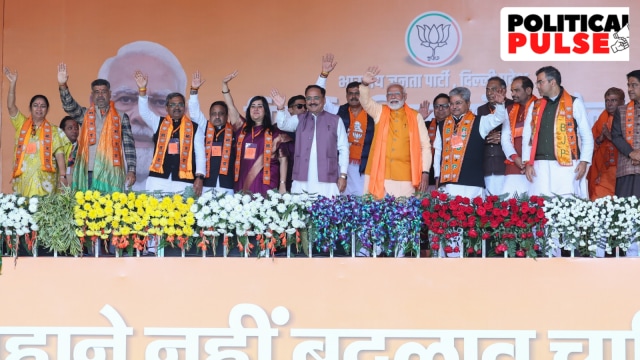The BJP victory in Delhi is another affirmation that Prime Minister Narendra Modi’s image as an election winner remains undented.

The Delhi win is both a vote of confidence in the credibility of “Modi’s guarantees” at a time when all the parties – both national and regional – are vying with each other on welfare politics, and the PM’s promise of “good governance”.
Story continues below this ad
Defeating the Aam Aadmi Party (AAP) goes beyond Delhi for the BJP as the Arvind Kejriwal-led outfit challenged the latter’s dominance in the North. Not having the Capital under it even as it redefined politics across the country remained an eyesore for the BJP.
Having fended off the BJP in the state elections twice since the rise of Modi, Kejriwal also fashioned himself as an alternative to the PM. After the 2013 narrow win and the AAP-led government’s fall, Kejriwal had even taken on Modi from the Varanasi Lok Sabha seat in the 2014 Lok Sabha polls.
Determined to decimate the AAP, the BJP left no stone unturned in Delhi, with ample help from the Centre. The Kejriwal government was in constant conflict with the Lieutenant Governor, with the Centre further tightening the screws since 2020 after the appointment of V K Saxena as LG.
In recent years, the Kejriwal government found its hands tied over many issues, with officials reporting directly to the LG, even as the top AAP leadership fought cases or found themselves in jail.
Story continues below this ad
Towards the end of the Delhi election campaign, the Modi government constituted the Eighth Pay Commission and announced big tax exemptions for the middle class in the Union Budget – both measures that went down well with the BJP’s middle class base as well as government officials in the Capital’s large bureaucratic set-up.
As Modi sought votes in his own name and the BJP deployed the full weight of its star faces in the campaign, it appeared to outweigh the shortcomings in the Delhi unit. The local BJP was all along seen as having failed to emerge as a force against the AAP in Delhi, with its inability to project a chief minister face seen as a confirmation of this.
The AAP, in contrast, started out strong, getting off the ground early in announcing candidates and going door-to-door. It reinforced its message of welfare politics and promised to build on it, even as the BJP’s corruption charges against Kejriwal didn’t seem to stick.
The BJP ultimately fell back on the Modi card, confident that the PM himself remained popular. All seven of Delhi’s Lok Sabha seats went to the BJP for the third consecutive time in the general elections last year.
Story continues below this ad
Apart from projecting Modi, the BJP tailored its campaign group-wise, given the diverse linguistic, regional and social diversity of Delhi. The big rallies were limited to the top leaders while the party’s local leaders focused on small meetings, including drawing room ones.
For example, a team of BJP leaders led by national general secretary Tarun Chugh and former Union minister Rajeev Chandrasekhar conducted around 5,000 such small meetings in the last seven weeks before the voting.
The BJP’s manifesto shed the party’s hesitation when it came to freebies and took on AAP promises directly. Modi repeated several times that none of Kejriwal’s popular schemes such as free bus rides for women, and power and water up to a certain limit, would be stopped if the BJP came to power.
There was no Hindutva rhetoric, as much a factor of what the party sensed on the ground as the fact that the AAP had shown it was as willing to go down that road.
Story continues below this ad
Additionally, the BJP identified issues like air pollution, the contaminated Yamuna and the deteriorating quality of life as obvious failures of the 12-year AAP regime – striking a chord with the Capital’s substantial middle class that didn’t see these as figuring among the AAP’s concerns.
BJP leaders also cited their candidate selection as a success story, with senior leaders like Dushyant Gautam, Ramesh Bidhuri, Kapil Mishra, Parvesh Sahib Singh and generation next such as Harish Khurana and Ravinder Singh Negi being fielded.

































